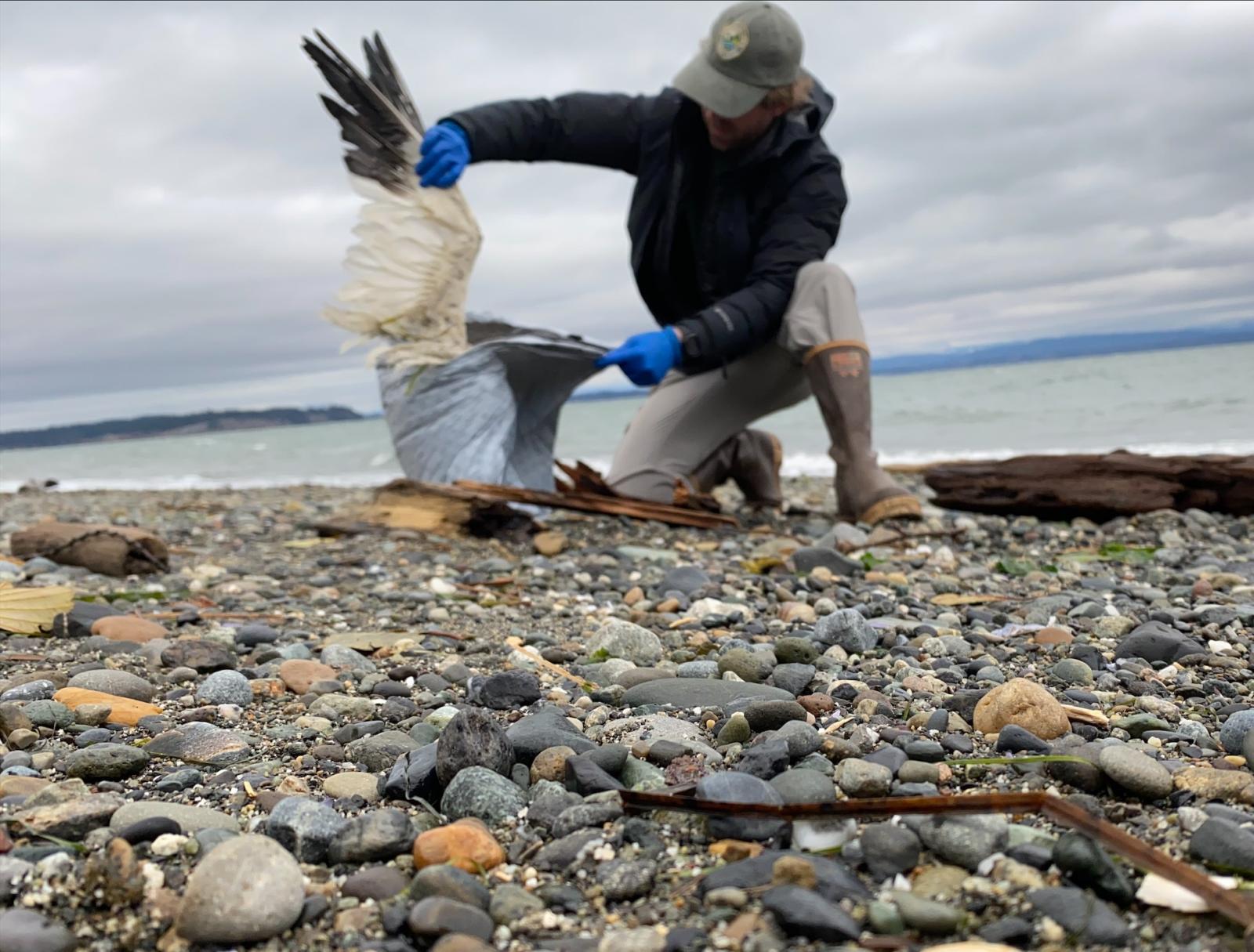Photos
Click to display full size or right-click to save to your device.
WDFW statement Dec. 8, 2022
Media contact: communications@dfw.wa.gov
Washington Department of Fish and Wildlife (WDFW) biologists recently responded to reports of sick or dead waterfowl in western Skagit County on and around Skagit Bay, as well as in northwestern Snohomish County and on Camano Island and Port Susan in Island County.
WDFW has retrieved more than 700 deceased birds of several species—primarily juvenile snow geese—from this area. Samples have been taken from these birds for testing for avian influenza (also known as bird flu), with H5N1 strain Highly Pathogenic Avian Influenza (HPAI) suspected.
WDFW continues to ask members of the public who find sick or dead birds to report them immediately using this online form and not touch them. As resources are available, biologists may respond to remove bird carcasses and, if in an area or species where avian influenza has not been confirmed, test for the virus. Due to the magnitude of this outbreak, WDFW staff will not be able to respond to all reported cases.
Infected birds may appear lethargic, unable to fly, and exhibit wheezing, vomiting, or have diarrhea or secretions from their mouth or nostrils. More detailed information about avian influenza is available on this WDFW webpage and in this blog post.
Avoid all contact with sick and dead birds. DO NOT attempt to move sick birds to a veterinarian or rehabilitation center, or to your home, as this can spread the disease. If a dead bird must be moved, it is best to wear disposable gloves while handling it and to double bag and dispose of the carcass in the garbage where pets and scavengers can’t reach it.
Reports of suspected avian influenza in domestic flocks should be sent to the Washington State Department of Agriculture. Call 1-800-606-3056 or visit their webpage for more information about how to protect poultry and other domestic birds.
From fall through spring, western Skagit County, Island County, and northwestern Snohomish County are major feeding and roosting areas for snow geese and other migratory waterfowl. The recent avian influenza hotspot around Skagit Bay follows a similar outbreak in November around Wiser Lake in Whatcom County. More than 450 dead birds have been removed from that area.
HPAI is very contagious among birds but the risk to people is low. This current strain of bird flu does not appear to easily infect humans. As a precautionary measure, people with known extended contact with infected birds should contact their local health department if they develop flu-like symptoms.
For hunters, waterfowl and other birds that appear healthy or are actively flying likely present minimal risk but should be cooked thoroughly before consumption. Dead geese and ducks found in western Skagit and Whatcom counties and northwestern Snohomish County are likely the result of avian influenza. Goose hunting has been closed in this area (Goose Management Area 1) since Nov. 27 and will reopen Dec. 10 through Jan. 29.
Dogs and other animals can become sick with avian influenza, and care should be taken to avoid contact between pets and either sick birds or carcasses of diseased birds. Wherever possible, maintain control of and discourage your dog from touching birds that were not shot immediately beforehand.
To reduce the risk of disease transmission, hunters are asked to not clean and dispose of bird carcasses in the field, but to do so at home and to double bag and dispose of bird carcasses in the garbage.
Additional safety tips include:
- Wear disposable gloves when cleaning harvested birds or cleaning bird feeders.
- Do not dispose of processed carcasses in the field where they could be eaten by raptors. Bag them and place in the garbage, bury, or incinerate them.
- Take special precautions to ensure that all equipment (boots, clothes, vehicles, firearms) are cleaned and disinfected to prevent the spread of diseases.
- Do not harvest or handle wild birds that are obviously sick or found dead.
- Do not eat, drink, or smoke while cleaning game.
- Wash hands with soap and water or alcohol wipes immediately after handling game or cleaning bird feeders.
- Wash tools and work surfaces used to clean game birds with soap and water, then disinfect with a 10 percent solution of chlorine bleach.
- Separate raw meat, and anything it touches, from cooked or ready-to-eat foods to avoid contamination.
- Cook game birds thoroughly. Meat should reach an internal temperature of 155 to 165 degrees Fahrenheit to kill disease organisms and parasites.
For additional information on avian influenza please visit: wdfw.wa.gov/species-habitats/diseases/bird-flu
Also, read the CDC article: U.S. Approaches Record Number of Avian Influenza Outbreaks in Wild Birds and Poultry
